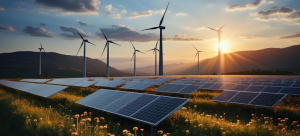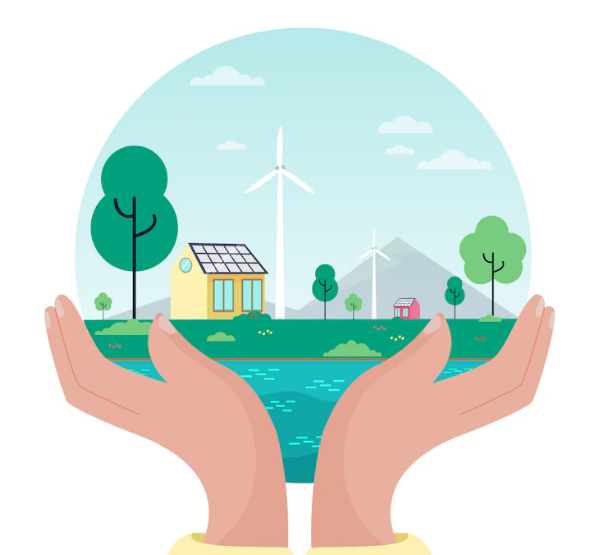Renewable energy has become a significant driver of the U.S. economy, contributing to job creation, technological advancement, and sustainable growth in 2024. As the nation continues to shift towards greener alternatives, the impact of sustainable power sources cannot be overstated. The increasing adoption of clean energy technologies fosters economic resilience and environmental stewardship.
The pursuit of renewable energy solutions plays a pivotal role in shaping a sustainable future for the United States. With a strong focus on innovation and efficiency, the country is making strides in reducing its carbon footprint while boosting economic performance. The integration of renewable energy into various sectors has proven to be a game-changer, offering economic benefits.
The economic impact of clean energy

The economic implications of clean power extend far beyond mere job creation. In 2024, the renewable energy sector is expected to generate numerous employment opportunities, ranging from installation and maintenance of renewable systems to research and development of cutting-edge technologies. These jobs are not only sustainable but also offer competitive wages and career growth potential.
Furthermore, investments in renewable energy infrastructure stimulate economic growth by attracting private investments and government incentives. These financial inputs help in revamping the energy sector, supporting local economies, and facilitating the transition to a greener energy landscape. The ripple effects on supply chains and related industries further amplify the economic benefits.
Additionally, the cost savings associated with renewable energy adoption cannot be ignored. As the technology matures, the cost of generating power from renewable sources continues to decline, making it a more economically viable option. This reduction in energy costs enhances the competitiveness of American businesses by lowering operational expenses.
Job creation in the renewable sector
One of the most prominent advantages of the transition to sustainable power is the creation of extensive job opportunities. The renewable energy industry, encompassing solar, wind, hydro, and bioenergy, offers a diverse range of employment prospects. From technical roles in engineering and system design to administrative and management positions, the sector is a major employer.
Moreover, the clean energy market promotes education and training programs aimed at building a skilled workforce. Colleges and universities are increasingly offering courses and certifications tailored to renewable energy technologies, preparing the next generation of professionals for this growing industry.
In addition to direct employment, the renewable energy sector supports indirect jobs in manufacturing, supply chain management, and logistics. These ancillary roles contribute to a broader economic uplift, ensuring that various communities benefit from the transition to clean energy.
Technological innovations driving growth
Technological advancements are at the heart of the renewable energy boom in the United States. Continuous innovation in renewable technologies, such as more efficient solar panels and advanced wind turbines, has been instrumental in making clean energy more accessible and cost-effective. These improvements drive technological progress and industrial expansion.
Moreover, breakthroughs in energy storage solutions play a key role in addressing intermittency issues associated with renewable energy sources. Enhanced battery technologies and grid integration systems ensure that energy produced from renewable sources is reliably supplied to meet demand. This reliability is crucial for energy security and economic stability.
Additionally, the adoption of digital technologies and smart grids enhances the efficiency of energy systems. Advanced analytics, artificial intelligence, and IoT (Internet of Things) applications optimize the generation, distribution, and consumption of renewable energy. These innovations contribute significantly to the sector’s overall growth and procedural efficiency.
Environmental and social benefits
The shift to renewable energy not only boosts the economy but also has substantial environmental and social advantages. A cleaner energy mix reduces greenhouse gas emissions, mitigating the impacts of climate change. This environmental stewardship is essential for preserving ecosystems and ensuring a sustainable future for coming generations.
Furthermore, access to renewable energy promotes energy equity by providing affordable and reliable power to underserved communities. As renewable installations expand, remote and rural areas gain improved access to electricity, driving social and economic development. This inclusivity helps bridge energy disparities and enhances quality of life.
Additionally, the use of renewable energy aligns with global sustainability goals and demonstrates the United States’ commitment to international agreements aimed at combating climate change. By setting an example, the U.S. encourages other nations to follow suit, fostering collective global efforts towards a more sustainable planet.
Policy support and future prospects
Government policies and legislative support are crucial in sustaining the momentum of the renewable energy sector. Federal and state incentives, such as tax credits, grants, and subsidies, drive investments and facilitate the deployment of clean energy projects. Policy frameworks that prioritize renewable energy development are key to the sector’s continuous growth.
Moreover, long-term strategic planning and international collaborations enhance the resilience and scalability of renewable energy initiatives. Comprehensive policies that integrate environmental, economic, and social objectives ensure that the transition to a green economy is inclusive and equitable.
The future of renewable energy in the U.S. is bright, with continuous advancements and increasing public and private sector commitments. As technology evolves and policy support strengthens, renewable energy will play an even more vital role in the nation’s economy, driving sustainable development and ensuring energy security for all Americans.


